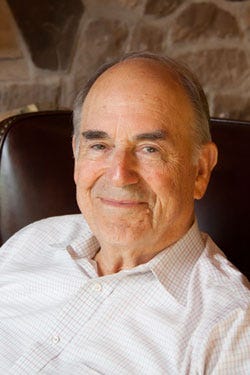The Makings of a Medtech Pioneer: John Abele
October 14, 2015
This week in San Francisco, Boston Scientific co-founder became the first non-physician to receive the TCT Career Achievement Award.
Brian Buntz
|
John Abele |
John Abele's accomplishments in the medical device field are almost too many to count. The co-founder of Boston Scientific has played a leading role in the field of interventional cardiology technology since its inception.
"He has had a profound and ongoing impact on less invasive medicine and interventional cardiology since its inception," said TCT director Martin B. Leon, MD before handing Abele the TCT Career Achievement Award this week in San Francisco. (See Abele deliver a keynote address on "Healthcare's New Patient Value Proposition and the Role of Technology" at Minnesota Medtech Week, November 4-5 in Minneapolis.)
After graduating from Amherst College in 1959 with degrees in philosophy and physics, Abele founded a lab-instrument company known as Advanced Instruments. The company made a number of diagnostic medical devices. The company had a uniquely collaborative relationship with its customers, inviting them to its factory for stints lasting several weeks where they would be taught how to use its products, identify potential problems, and even learn how to assemble its laboratory machines. Abele witnessed how successful this strategy was of turning customers into friends and partners, which helped give the firm an edge over its competitors. The theme of collaboration extends beyond Abele's tenure at Advanced Instruments to the present.
While at Advanced Instruments and afterward, he began to develop ties to influential medical device pioneers like Earl Bakken, Charles Dotter, Bill Cook, and a range of prominent cardiovascular surgeons such as Michael E. DeBakey and Dwight Harken, who helped develop cardiac surgery. These relationships helped him learn of important clinical needs and strategies to address them.
In the mid 1960s, he played an integral role in launching the Association for the Advancement of Medical Instrumentation (AAMI) that helped establish standards for medical devices. Working with doctors and other medical device companies, AAMI helped standardize medical instrumentation, which at that point was lightly regulated. This in turn played a supporting role in helping drive a number of medical breakthroughs, helping, for instance, spur progress in the field of organ transplantation.
In 1969, Abele began working at a company called Medi-Tech and began a close partnership with its founder, Itzak Bentov, a Czech inventor who spoke 11 languages. The two began work on the multi-lumen steerable catheter, which would eventually emerge as a versatile platform for minimally invasive diagnosis and surgery.
In 1974, Abele met Andreas Gruentzig, MD, who eventually would go on to develop the first percutaneous transluminal coronary angioplasty (PTCA) procedures. Abele flew to Zurich to meet with Gruentzig, who had been making prototypes for his balloon catheter devices in his home. Abele helped Gruentzig form a strategy to develop the device. In 1977 and 1978, the first balloon angioplasties were performed in the United States.
Abele's contract with Medi-Tech gave him the option to buy it. This possibility laid the groundwork for the founding of Boston Scientific, which he founded in 1979 as a holding company with the help of Peter Nicholas, a powerful pharmaceutical executive. Boston Scientific began to be known for develop a series of innovative minimally invasive devices only a few years after FDA had passed the 1976 Medical Device Amendments. The company developed a habit of closely collaborating with physicians and for providing education. Abele started contributing to medical journals, angioplasty seminars, and medical textbooks. "He was adamant that you had to teach people how to do these procedures and was a strong supporter of the live-case demonstration courses, which began in Zurich 1978," said Martin B. Leon at TCT. Abele was also a proponent of the use of registries--detailed bodies of knowledge on specific diseases. Abele's educational approach proved to be valuable in getting physicians to use products that were then unconventional.
Boston Scientific went public in 1992. By the early 2000s, the stock skyrocketed, making Abele a billionaire. Abele would work at the company until 2005 and would be named on many of the company's patents.
In 1997, he founded the Argosy Foundation, a private family foundation, which makes charitable investments supporting philanthropic endeavors. The group has thus far given away $100 million.
He also helped establish the Kingbridge Conference Centre outside of Toronto, CA. "I bought Kingbridge because I wanted to explore the idea of an experimental place where people could learn to communicate in a way that harnesses collective intelligence," Abele said in an article by the Korn Ferry Institute.
Abele has helped teach how to introduce disruptive technologies and has become actively involved in FIRST, a scientific outreach organization for children that was founded by Dean Kamen. Abele served as the chairman of the organization from 2002 to 2010. The group organizes a series of robotics competitions designed to show high school kids that science is cool.
In recent years, Abele has won numerous awards including the 2015 MDEA Lifetime Achievement Award.
When accepting his most recent award at TCT, Abele said: "It's fun to think of all the friends we have made over the years and watched this journey as we continue to progress. And by the way, it never stops."
(See Abele deliver a keynote address on "Healthcare's New Patient Value Proposition and the Role of Technology" at Minnesota Medtech Week, November 4-5 in Minneapolis.)
Like what you're reading? Subscribe to our daily e-newsletter.
About the Author(s)
You May Also Like



